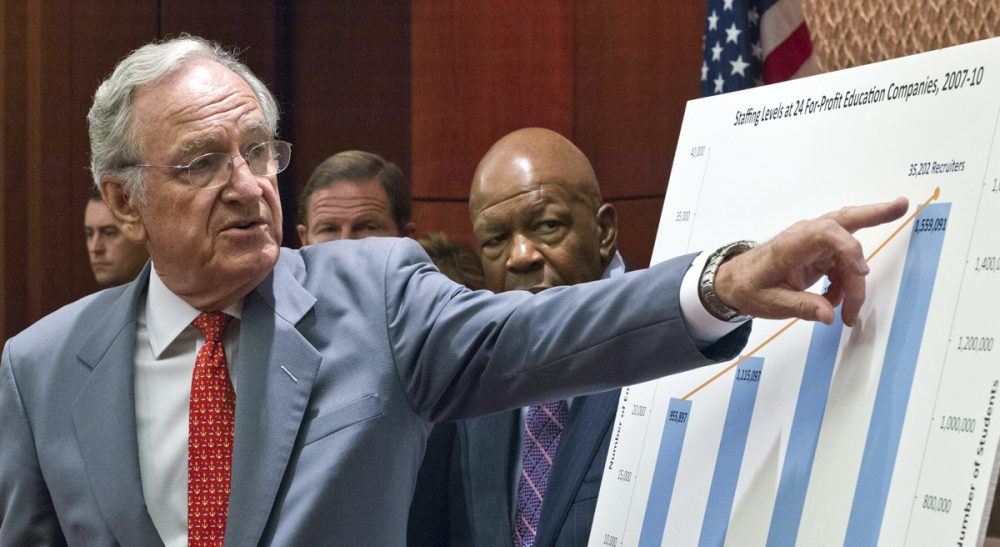Advertisement
An Enemy In Common? The Case Against For-Profit Colleges

Investigators and regulators at the state and federal levels have been training their sights on for-profit colleges and trade schools to bring pressure on the industry to clean up its act, particularly its targeting of veterans.
For-profits see service men and women returning from Afghanistan and Iraq as gold mines, as each soldier represents tens of thousands of dollars in federal GI Bill benefits and access to federally subsidized student loans. Eight of the 10 schools receiving the most GI Bill dollars are now for-profit colleges, according to a recent U.S. Senate committee study.
Together, those eight schools reaped more than $1 billion in GI Bill benefits in 2010. This in spite of the fact that almost half a million veterans dropped out of those colleges within the first year, most within the first four months of enrolling.
As Americans, we should all be concerned that veterans are being taken advantage of by unscrupulous profiteers. As taxpayers, we should be aware that we are paying for this disservice.
As Americans, we should all be concerned that veterans are being taken advantage of by unscrupulous profiteers. As taxpayers, we should be aware that we are paying for this disservice. Approximately 85-95 percent of the for-profits’ revenue comes from taxpayer-supported benefits.
To better protect veterans and all students duped by the for-profits, the Obama administration and Congress have enacted new rules requiring more transparency and honesty about cost, graduation rates, loan default rates, accreditation and job placement rates. The Veterans Administration has launched new tools for veterans to file complaints (Postsecondary Education Complaint System and VA GI Bill Feedback System) and compare colleges. The U.S. Department of Justice, the Federal Trade Commission and other federal agencies are investigating allegations of fraud and false advertising.
More than 30 state attorneys general have intensified their scrutiny of for-profits. Some, including Massachusetts AG Martha Coakley, have filed lawsuits on behalf of aggrieved students — many of them veterans — and proposed tougher state regulations to curb the for-profits’ predatory marketing practices. Coakley recently filed suit against Corinthian Colleges Inc. and Corinthian Schools Inc., charging the companies with unfair and deceptive marketing practices and exerting pressure on students into high-interest loans. Corinthian is one of a dozen education corporations currently under investigation by a coalition of 14 AGs in conjunction with the Department of Justice. Coakley is also in the process of implementing new regulations designed to prevent companies from deceiving students and lying about the value of their education programs and financial-aid practices.
The for-profit education industry is fighting back, launching multimillion-dollar advertising and lobbying campaigns to block any new legislation or regulation under the laughable pretense that it is trying to safeguard educational opportunities for poor people. No matter how much it spends to sugarcoat its record, it cannot hide its sordid past.
There are more than 3,000 for-profit education companies in the U.S. and 136 in Massachusetts. They spend tens of millions of dollars to lure students with TV, radio and Internet advertising, as well as direct marketing tactics, including an avalanche of spam email and constant phone calls. Their recruiters aggressively pursue members of vulnerable populations. They promise a high-quality education that will lead to high-paying jobs.
The bottom line: many for-profits leave students with substandard educations, non-transferable credits, useless degrees or no degrees at all, and with heavy student loan debt.
What they really deliver is often far less. More than half of the students who enroll in a for-profit program leave without a degree or diploma after only a few months, according to the Senate committee report. Shockingly, students sometimes complete their degrees only to find that the “college,” or a specific degree program, was not properly accredited. That means that even graduates of those schools or programs are ineligible for licensing exams in the professions they studied for, including plumbing and electrical, law and health care.
The bottom line: many for-profits leave students with substandard educations, non-transferable credits, useless degrees or no degrees at all, and with heavy student loan debt. The U.S. Department of Education reported that students at for-profit colleges represent 13 percent of all college enrollment, but account for nearly half of all loan defaults.
The Obama administration recently proposed new rules to limit how much debt students can accumulate as a proportion of the income they earn after they graduate. Exceeding any of these limits would put colleges in jeopardy of losing federal aid. It’s a way to ensure that these colleges are held responsible if their programs do not lead to the “high-quality,” “high-paying” jobs promised by their recruiters. These are important new regulations that should be adopted and implemented swiftly.
Related:
